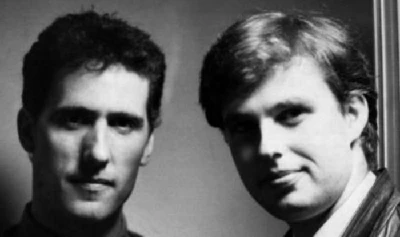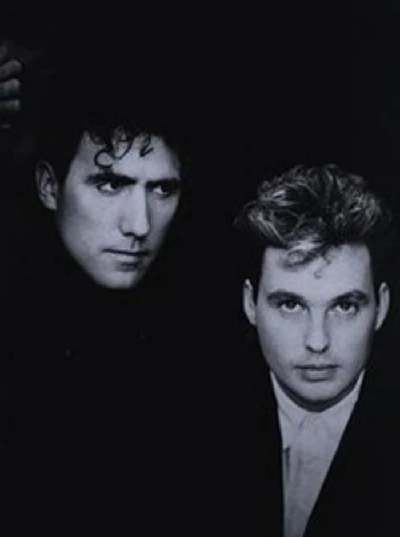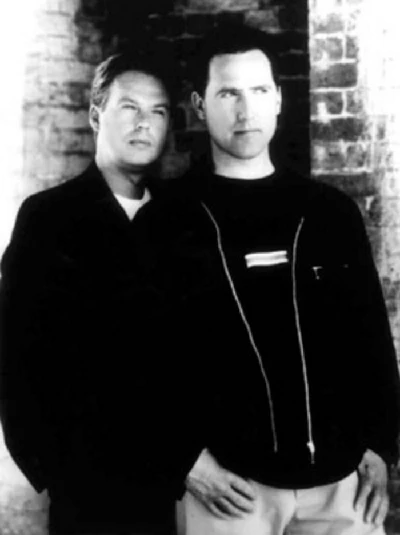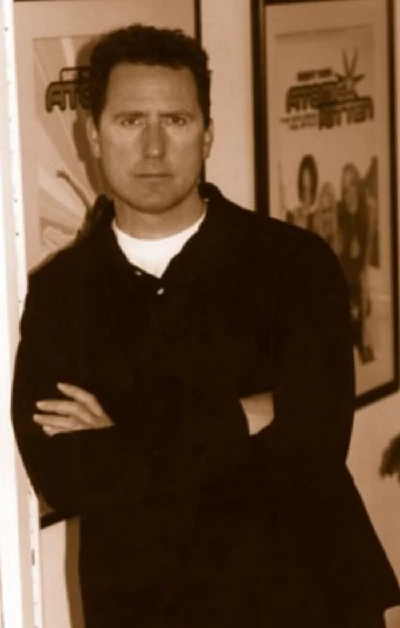OMD
-
Interview
published: 11 /
1 /
2009

John Clarkson speaks to Andy McLuskey from Orchestral Manoeuvres in the Dark about their debut release on Factory Records, the continued influence of Factory on their music and his band's recent reformation
Article
Orchestral Manoeuvres in the Dark were one of the great pop acts of the 1980s. Formed around a nucleus of Andy McCluskey (vocals/synthesisers/bass) and Paul Humphreys (synthesisers) in 1978, they had a string of Top 20 hits with the likes of ‘Messages’, ‘Enola Gay’, ‘Souvenir’, ‘Joan of Arc’, ‘Maid of Orleans’ and ‘Genetic Engineering’. Their third album, ‘Architecture and Morality’, reached number 3 in the British album charts and sold over three million copies.
While their music became latterly after their fifth album, ‘Junk Culture’ (1984), increasingly more commercial and poppy, their first four albums, ‘Orchestral Manoeuvres in the Dark’ (1980), ‘Organisation’ (1980), ‘Architecture and Morality’ and ‘Dazzle Ships’ (1983) were more experimental affairs, and combined soaring melodies with the abstract and the avant-garde.
Although Orchestral Manoeuvres in the Dark, who came originally from near Liverpool, soon signed to DinDisc, an offshoot of Virgin records, their 1979 debut single, ‘Electricity’ (FAC6), the manufacture of which was stopped at 5000 copies as a result of production problems with the sleeve , was one of the first releases of Factory Records.
McCluskey and Humphreys dissolved their partnership after seven albums in 1989, with McCluskey, electing to carry on his own under the moniker of OMD for a further three albums, before finally putting the project on hold in 1996. They got back together in late 2006, and, with Martin Cooper (keyboards) and Malcolm Holmes (drums), who both joined the band in 1980 also rejoining, have played two sell-out tours of the UK.
With a new Factory 4 CD box set, ‘Communications’, having recently come out, Pennyblackmusic spoke to Andy McCluskey about ,despite their brief tenure there, the continued influence of Factory Records on Orchestral Manoeuvres in the Dark’s music and their recent reformation.
PB : Liverpool in the late 70’s and early 80’s had an especially fervent live scene. Many of the acts from that era-Big in Japan, the Mighty Wah, the Teardrop Explodes, Echo and the Bunnymen, the Wild Swans and yourselves-went onto either commercial or cult success. There have been both books and film documentaries about the music scene in Liverpool during that period. Were you aware at the time that you were part of something special ?
AM : The whole of the Liverpool music scene at that time focused around Eric's Club, which was the catalyst and the centre of everything that was going on, but, no, absolutely not. When you're nineteen years old, the last thing you think about is your perceived legacy in the history of music (Laughs). You get your head down. You might be grateful for the opportunity and you get on with what you feel like you're doing.
PB : As the Liverpudlian group of that era which was experimenting most openly with synthesisers and technology, did you feel part of that scene or did you feel outsiders ?
AM : We felt outsiders. It wasn’t just that we playing synthesisers when everybody else was playing guitars. It was partly down to geography. We were from the Wirral and the other side of the River Mersey. Paul Humphreys and I had found our alternative music in 1975 with Kraftwerk before the advent of punk, so we weren't really influenced as directly by that as some of the other bands were in Liverpool.
We were still allowed though the opportunity to get on the stage at Eric's. We played with all the other groups of the time, the Teardrops and the Big in Japans, but perhaps an indication of that outsider situation which we found ourselves in was that we didn’t sign to the Liverpool label Zoo Records. We signed to a Manchester label.
PB : There has always been a certain amount of rivalry between the Liverpool and the Manchester music scenes. How did this band from the Wirral end up putting its debut record out on such an essentially Mancurian label as Factory Records ?
AM : Essentially they offered us a deal and Zoo Records didn't. Eric's Club and Factory in its very early days had a reciprocal relationship. I didn’t know it at the time, but they were in talks together at one stage to start a record company.
We were offered the opportunity to go and play a Factory Records gig. This was long before the Hacienda. There was this club in Hulme which they used to rent out on occasions. We played our very first gig at Eric's supporting Joy Division on a Thursday night on what was a free-to-members night. You didn't get paid and people didn't pay to get in, but at least you got to play an established club. Afterwards Roger Eagle, who ran Eric's, said, “We have got this relationship with these people in Manchester. Do you want to go and play a place called the Factory?" and we were like, “Yes.”
Our second gig was for Factory and we supported Cabaret Voltaire. We of course met Tony Wilson there and so afterwards we very cheekily sent him a cassette. The story I believe is that Tony Wilson got the cassette and he wasn’t that enamoured with it, but his wife (Lindsay Reade-Ed) also heard it when they were going somewhere in their car and was. Peter Saville (Factory’s sleeve and poster designer-Ed), who thought that it was very amusing for a pair of a guys from Liverpool to be into Kraftwerk, and his wife persuaded Tony that they should offer us a record deal.
PB : You only ever released one single with Factory, ‘Electricity’. Were you always signed to do just a one off single at Factory ? Did they never offer you an album deal ?
AM : No, it was always going to be a one off single deal. Tony Wilson told us, “What you are doing is the future of pop music?” and we were like, "Fuxk off ! How detrimental. How dare you call it the future of pop music, you bastard !" We were deeply insulted. He was, however, absolutely adamant and said, "No, No. This is the future of pop music even if you don't know it. We're only a small label. You should be on 'Top of the Pops'. We will put 'Electricity' out on Factory and use it essentially as a glorified demo to get you a record deal." We were like, "Yeah ! Pull the other one." But that is exactly what happened.
PB : How quickly afterwards did you sign to DinDisc?
AM : 'Electricity' came out in May 1979. Carol Wilson, who had just started DinDisc, heard it because Tony sent it out to some of the record labels in London. We were playing in Blackpool with A Certain Ratio and Joy Division on a Factory night and she travelled up and offered us a contract. That would have been August 1979. That was how quickly things moved.
PB : Martin Hannett (Factory’s in-house producer-Ed) apparently recorded a slowed down version of 'Electricity' , but another version had been made of it by your manager. Which version actually ended up on the Factory single ?
AM : The actual Factory single is the very first mix that we ever did. It was the demo that we had sent to Factory and which had been recorded in our manager's garage. Martin didn't slow it down, but he made it a lot more ambient and effects-laden, as you would expect from him. The piano melodies were swamped in reverb and delays and we thought that it had lost its energy.
Tony Wilson was, however, adamant that we kept Martin's version of 'Almost', which was the B side on the record. He made it very ambient. It was this very bouncy pop song and he transformed it into this beautiful, sweeping song, so it was Martin's version on the B side, but it was our garage demo that was released on the A side. When DinDisc re-released ‘Electricity’ in September 1979, it was, however, Martin’s version that they used on both sides.
PB : Orchestral Manoeuvres in the Dark was born out of the ashes of another eight piece band, Id, that involved you and Paul. Who were they ?
AM : That was just an extended group of school friends. It was an art college combo. It started off with three singers and two drummers and was totally mad. It was a case of "You've got an instrument. Do you want to play ?" It included my girlfriend, Julia Kneale, who used to come on stage wearing a suspender belt and stockings and whip the audience with a large bullwhip (Laughs).
PB : Is it true that the ‘Orchestral Manoeuvres in the Dark’ album consisted entirely of songs which had originally been composed for Id ?
AM : Not completely. A lot of them were though. 'Electricity' was written when Paul and I were sixteen. That was written in '75. '76. Several of the other songs, 'Red Frame/White Light' and Julia's Song', for example, were written when we were in Id. Half to two thirds of that album was written before we were nineteen years old, before we had even invented Orchestral Manoeuvres in the Dark.
PB : Where did such a vibrant name as Orchestral Manoeuvres in the Dark come from ? Was that just a reaction to the greyness of the post punk scene ?
AM : It was partly that. It was also an attempt to make people clearly realise that we were not a punk band. We were not going to be called the “Something-very-short,single-syllable.”
The two of us were playing songs that even our best mates thought were shit and which were influenced by German bands and Brian Eno, who, while he was very hip, wasn't selling lots of records at the time. We used a tape recorder as a backdrop that we had borrowed off a mate and equipment that we had bought through mail order catalogues. We wanted people to know that this was not your average band.
We chose the most unusual and preposterous title that we could think of. We might have put a lot more thought into the name, but essentially it didn’t really matter what we called ourselves because our original intention was to play just one gig and to then split.
PB : How long did that idea last of doing just one gig ?
AM : Until Roger Eagle at Eric's offered us the opportunity to go down to Factory Records to do another one (Laughs). It was incredible the way we took of. It was a string of amazing coincidences.
Paul was studying electronics. I had gone to art college. I was probably going to do an art degree-I had just taken a year out- and he was probably going to be an electronics engineer. We had this hobby that we were into electronic music and things that our friends were thought were crap . We used to go and play around and make noises in his mother's back room when his mother went out to work.
Then Daniel Miller at Mute Records released 'Warm Leatherette' by the Normal. I remember hearing it for the first time. Paul and I were standing in Eric's and we said to each other, "That's it. Some bastard has done what we are doing already. We've got to get out there and play at least one show, just so that we can say we have done it." We dared ourselves to go on stage basically.
At that first gig in which Orchestral Manoeuvres in the Dark supported Joy Division, there were maybe twenty five people in the audience and nobody clapped and most of them were our friends and family (Laughs). It is really surreal if you think about it now (Laughs), but that is really the way it was. Nobody had heard of Joy Division. Nobody had heard of us, but from that incredibly all these wonderful doors opened for us.
PB : Paul Humphreys has said on the sleeve notes of 'Architecture and Morality' that you walked" this tightrope of pure experimentalism and pop commerciality and you left your audience and even sometimes yourselves wondering which side you were going to fall on." Would you agree with him about that ?
AM : Yeah, in the very early days in particular there were no rules. We didn’t go on 'X Factor' and sell our arses to Simon Cowell and do whatever we were told to do. We did what the hell we felt like doing and amazingly somebody offered us a gig, somebody offered us a record contract, and then somebody offered us a major contract. People kept opening doors for us. We weren't knocking on the doors, saying "Excuse me. Can we get on 'Top of the Pops'? Can we be famous ? Can we sell millions of records ?"
Paul Humphreys and I did what the hell we felt like doing and amazingly by writing our own rules we came up completely accidentally with this complete new wave/pop punk distillation of Kraftwerk and Brian Eno. We took what they did, and managed to weld it into a collection of three and a half minute pop songs.
'Enola Gay', for all its millions of sales, was just as experimental to us as some of the weird stuff we did on the B sides or the albums. The record company used to say to us, "Can you go guys decide if you want to be Joy Division or Abba or Stockhausen ?" and we would say to them, "No. We're all of that because that is what makes sense to us."
PB : Peter Saville did the record sleeve for the original version of ‘Electricity’ and, while you had left Factory, you then continued to use him to create all your album sleeves up until 'Dazzle Ships'. How much involvement did you have with him in making those sleeves ? Did you tell him what you wanted and discuss it with him, or did he simply go off and create what the music and titles of the album suggested to him ?
AM : From what Peter has told me and from what I know of his relationship with other bands I think that we had the most symbiotic relationship of all the acts that he ever worked with. Maybe it is because I came from an art background, but Peter and I would often sit and discuss ideas for sleeves for hours. There was always an awful lot of discussion in advance. It was never just a case of “Here, listen to this. Chuck something together.”
Sometimes in fact Peter influenced us. It was his girlfriend Martha Ladly (the keyboardist with Martha and the Muffin-Ed) who suggested the title 'Architecture and Morality', and it was Peter himself who suggested 'Dazzle Ships'. He came to me with a picture by Edward Wadsworth of the dazzle ships in Liverpool Docks in 1919. He said, "Look. I have found this amazing painting. Wouldn’t it be amazing to do a sort of modernist tile sleeve version of it ?" and I went, "Alright. I will write a song called 'Dazzle Ships' so we can call the album that” (Laughs).
PB : Every one of the early Orchestral Manoeuvres in the Dark albums is really distinct. Was that the essential criteria of you and Paul for making an album – that you had to do something different from the last one ?
AM : Yeah. You're absolutely right. The first album was an accumulation of the songs that we had written in the very early stages. ‘Organisation’ was influenced by the gothic darkness of Joy Division. 'Architecture and Morality' was influenced by a desire to use a mellotron and to experiment with choral and religious sounds and then 'Dazzle Ships' was my response, which Paul Humphreys has only just forgiven me for, to the success of ‘Architecture and Morality’.
'Architecture and Morality' had sold three million copies. People kept saying to me, “You say you are trying to change the world with your music. How exactly is it you are going to change the world with songs about saints and things like that ?”, and I was like "You're right really", and so I decided to get much more radical and political with ‘Dazzle Ships’.
We had to change the sound on every record. It was our art. It was so important to us that we didn't repeat ourselves and so we tried to do something different every time.
PB : You recently reformed and have gone back out on the road. Those shows have been really energetic and vibrant affairs. As a man who is now in his late 40s, how do you manage to maintain such energy on stage ?
AM : To be honest it was my forced intention in my middle age to finally have some dignity. The reality is that faced with a live audience and my music I couldn't (Laughs).
As the 80s went on I started to throw myself around stage more and more. I think that was all born out of frustration and because lazy journalists kept saying that there was no humanity or energy to our music, so I started throwing myself around on stage as a reaction to that. I was basically saying, "Well, I can dance. What about the rest of you ?"
It has become almost shamanistic now. If I don't come off stage absolutely exhausted then it doesn’t fill like a real gig. I get completely carried away. It is a buzz. I enjoy gigs with energy. We usually start slow and weird and wind up.
We have been delighted at how well we have been received and I think audiences have been quite pleasantly surprised that we can still cut it on stage. We still try to walk a tightrope. We have had a lot of hits and we have to play those for the 'Best of' brigade because a lot of the audience only knows the singles, but there are people who know the album tracks and the strange stuff and we want to play those as well.
PB : You have toured twice now with OMD since you reformed. What will you do next ?
AM : Peter Saville and I have just done an art instillation which is on in Liverpool at the moment. We have put together five pieces of music and film based on power station. There are no lyrics at all, and we have literally tried to find the sound of the power stations and build music out of them. It has been wonderful because it was like being eighteen all over again. There were no rules anymore. I didn’t have to worry about if it has to sell because it is not for sale. It has been great.
OMD meanwhile are going to be playing the festivals this year and hopefully broadening our appeal outside the UK. There will also be a new album in 2010.
PB : Thank you.
Band Links:-
https://en-gb.facebook.com/omdofficial
http://www.omd.uk.com/
https://twitter.com/officialomd
https://www.youtube.com/user/OMDenglis
https://plus.google.com/10638569313334
Picture Gallery:-



Visitor Comments:-
|
|
167 Posted By: John Clarkson, Edinburgh on 23 Feb 2009 |
Thanks for your comments, G Olvanhill. I am glad that you enjoyed the interview and the questions. We don't pretend to be anything but fallible at Pennyblackmusic and I am always happy to be corrected when I have got it wrong as was the case here.
I have put some corrections through this morning to take account the misspelling of the names (not my strongest point) and also your pertinent and informative comment about the production problems with the Factory version of the sleeve. Thanks again for that. I hope that you enjoyed the two British reunion tours to date as much as I did.
|
|
166 Posted By: G Olvanhill, Teesside on 22 Feb 2009 |
Been a fan for 29 yrs and found the interview very good I enjoyed the questions. Preview article is sloppy it's Andy McCluskey and Martin Cooper for a start and the Factory version of Electricity was not a ltd Ed but production problems due to the method of making the black on black sleeve caused the run to stop at 5000.
|